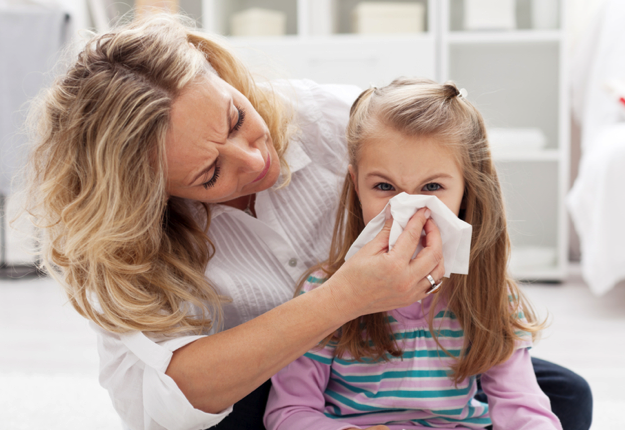Do you want to beat hay fever without dosing up on a vast collection of prescribed or over-the-counter medication?
It’s Pollen Season in Australia and New Zealand. Pollen comes from plants and it varies with times and location. For example, trees pollinate in late winter and early spring. Grass pollen numbers are also higher in inland areas, where there are no natural barriers to wind dispersal. To better anticipate pollen season for your area, it’s easy to do an internet search, or to ask Siri.
18% of Australians and New Zealanders suffer from seasonal allergies and, if left untreated, hayfever can produce long-term complications. Untreated hayfever can result in mouth breathing, a dental overbite, and chronic swelling in the nasal passages. Not to mention, many kids with allergic rhinitis have difficulty concentrating at school and battle daily fatigue.
Approximately 80% of people with asthma suffer from seasonal allergies. Common seasonal allergy symptoms include: congestion, sneezing, watery eyes, scratchy throat, asthma, hives, eczema, exhaustion, mood swing and irritability. There are several conditions that can increase the risk of pollen allergies, such as unmanaged stress, lack of exercise, poor nutrition, sleep deficit, deviated septum, pregnancy or a recent trauma or illness.
These conditions need to be managed under a doctor’s care because they can adversely affect your immune system functioning. A strong immune system is key to fighting seasonal allergies.
Natural Treatments for Seasonal Allergies
Increase your consumption of these foods
- Fresh fruits: mango, pear, watermelon, apple, kiwi, cantaloupe, grapes, berries
- Fresh vegetables, organic when possible
- Dairy substitutes: coconut milk, hemp milk, almond milk, rice milk
- Leafy herbs
- Organic, free range eggs
- Gluten free grains: quinoa, rice
- Freshly wild caught fish
- Herbal teas
The above foods are low histamine foods which means they are least likely to irritate the immune system. They are also power houses of Vitamins such as Vitamin C, Vitamin D, Magnesium, and Antioxidants such as Quercitin.
Avoid these foods
- Sugar
- Caffeine
- Bottled fruit juices
- Food preservatives
- Processed foods additives
Beware of these foods: these foods cross react with your allergen and may increase your allergy or asthma symptoms.
Reduce your exposure to Pollen
- Wear a protective mask when gardening or doing yard work.
- Use HEPA (high-efficiency particulate air) filters in air conditioners to better trap pollen spores. Change filters often.
- Check pollen counts before you travel.
- Wear sunglasses when outdoors to reduce the amount of pollen coming into the eyes,
- Wash your hair and shower at the end of the day. This will help avoid pollen transfer to pillowcases and bedding.
- Exercise in the morning or late in the day. Pollen counts typically are higher on a hot, windy, sunny day.
- Check the pets, they are known pollen carriers.
- Leave your shoes at the door.
Other helpful solutions
- Nasal Saline for rinsing pollen out of nose, to reduce symptoms, and decrease medication use by 62%
- Vitamin D, a critical vitamin for immune system function – Eggs, Salmon, Cod Liver Oil, Tuna, Sardines. Vitamin D increases the effectiveness of nasal corticosteroids in those suffering from Allergic Rhinitis
- Probiotics are effective in treatment and prevention of allergies
- Juice Plus, are fruits and vegetables in gummies or capsules. Organically grown, dye free, chemical free. Improves immune system function
- Quercetin is a natural anti-inflammatory bioflavonoid – apples, berries, capers, grapes, onions, shallots, tea, and tomatoes, many seeds and nuts. Best effect if started 4-6 weeks before allergy season.
- Vitamin C, an antihistamine, is one of the most important antioxidants and immune enhancing nutrients to an allergy sufferer. Found in Red Peppers, Oranges, Kiwi, Melons. The effect of Vitamin C is enhanced when taken with Quercetin
- Nettle Leaf, a natural antihistamine that naturally blocks the body’s ability to produce histamine. For allergy relief, capsules made from dried nettle leaves are the easiest and most effective option. Best results if started 4-6 weeks before allergy season.
- Local Raw Honey, in those older then 12months old, has shown promise in the prevention of Seasonal Allergies.
- Omega-3 Rich Food – Salmon, Free Range Eggs, Free Range Grass Fed Meats, Avocado, Olive Oil, Nuts. It has been shown to boost the immune system
Do you or your children suffer from the hay fever season? Let us know what you think or share any other helpful hints to decrease the effects of allergies this Spring.




















-

-
-
mom101628 said
- 22 Dec 2017
-

-
-
ella12 said
- 31 Oct 2017
-

-
-
tessie said
- 29 Oct 2017
-

-
-
mom112217 said
- 27 Oct 2017
-

-
-
musicmum said
- 26 Oct 2017
-

-
-
rovermum said
- 26 Oct 2017
-

-
-
Ellen said
- 19 Oct 2017

-

-
-
mom247592 said
- 18 Oct 2017
-

-
-
mom93821 said
- 18 Oct 2017
-

-
-
country chick said
- 17 Oct 2017
-

-
-
mom104749 said
- 17 Oct 2017
-

-
-
ashna9 said
- 17 Oct 2017
-

-
-
mom90758 said
- 17 Oct 2017
-

-
-
mom81879 said
- 17 Oct 2017
Post a comment11:00 pm
3:51 pm
1:29 pm
1:00 pm
11:13 pm
5:17 pm
4:21 am
-

-
-
mom265046 replied
- 25 Oct 2017 , 4:38 pm

-

-
-
Ellen replied
- 27 Oct 2017 , 3:42 am

Reply10:44 am
-

-
-
mom265046 replied
- 25 Oct 2017 , 4:41 pm
Reply10:28 am
-

-
-
mom265046 replied
- 25 Oct 2017 , 4:42 pm
Reply10:56 pm
8:51 pm
-

-
-
mom93821 replied
- 19 Oct 2017 , 6:59 am
Reply5:49 pm
1:27 pm
12:16 pm
To post a review/comment please join us or login so we can allocate your points.